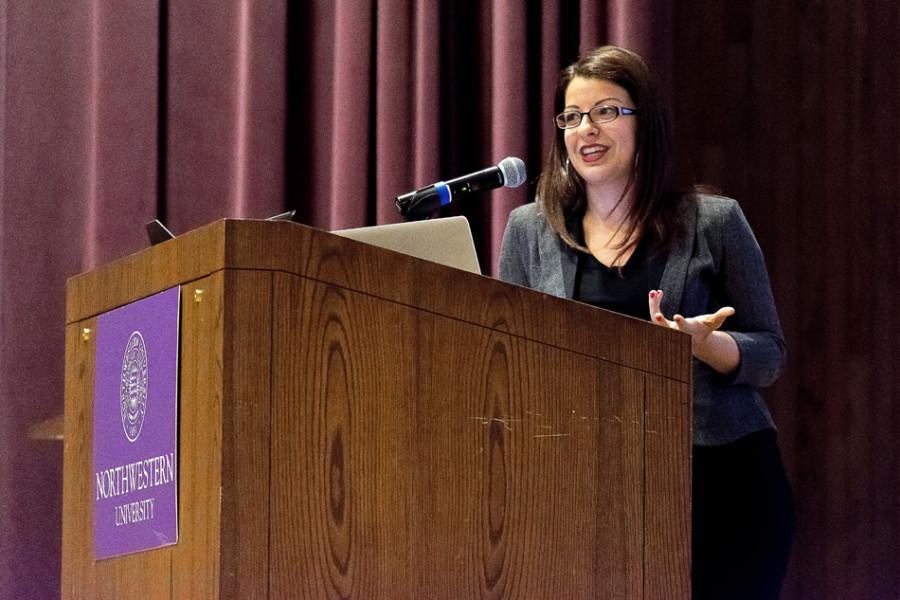Blogger discusses female roles and representation in video games
Nathan Richards/Daily Senior Staffer
Blogger Anita Sarkeesian speaks Wednesday about the misrepresentation of women in video games. Sarkeesian, the founder of the blog Feminist Frequency, was invited to Northwestern as Public Affairs Residential College’s annual speaker.
April 8, 2015
Blogger and media critic Anita Sarkeesian spoke about the hypersexualization of women in video games Wednesday during the Public Affairs Residential College’s annual speaker event.
Sarkeesian is the creator of Feminist Frequency, a video blog that explores the representation of women in pop culture. The site features “Tropes vs. Women in Video Games,” a YouTube series Sarkeesian started in 2013 that discusses the role of gender in video games.
Due to her involvement in “Tropes vs. Women,” Sarkeesian has been the target of death threats, rape threats and online harassment, mainly from groups on sites like Reddit and 4chan, who identified themselves under the Twitter hashtag “#gamergate.”
The attacks, however, have not stopped Sarkeesian from speaking out about female rights and equality, especially in the gaming community. She said she aims to create enough social consciousness among the gaming community to make game developers start changing the way women are represented.
“It is no secret that gaming has been male-dominated since the very beginning of the medium,” she said to a crowd of about 100 people, “and this notion that gaming is supposed to be the domain of young men is something I’ve heard for a very long time.”
Sarkeesian, who has been playing video games since she was about five, said she has been constantly told she’s not a gamer because she’s a woman.
“I’ve had a bit of a contemptuous relationship with gaming ever since, like many women who game, there have been periods in my life where the constant sexism and alienation in the industry and the community became almost too much to handle,” Sarkeesian said. “As women, we’re told by the marketing and often by games themselves that they’re not for us, we’re told by our parents and peers and friends that they’re not for us and all of those influences and social pressures do have an impact.”
During her talk, Sarkeesian projected video clips and images of several video game characters that illustrate the obvious differences between female and male characters, specifically the hypersexualization of female characters. She focused her talk on things she said developers can do to make games more inclusive toward women.
Several of her tips discussed the design of female video game characters. She said they are often depicted wearing lingerie “armor” and not much else, and that most female body shapes in video games are the same, featuring long legs, big breasts and delicate complexions.
“You’ll notice how the male characters tend to be defined by their personalities, quirks and differences, while the one female character is represented by her gender, often in very stereotypical ways,” she said.
She poked fun at how female characters walk in video games, saying they look like they’re “walking down a runway at a fashion show in high heels” when they’re supposed to be in combat situations.
Sarkeesian also said games often have women of color, not to be more inclusive, but to culturally appropriate them to satisfy storylines.
There is hope, Sarkeesian said, because she has heard from several developers who want to create better representations of females in video games.
“I think we’re going to start to see more of that,” she said.
Zachary Elvove, PARC’s historian and organizer of the event, said he thought Sarkeesian would be a good speaker because her work focuses on sexism in a nontraditional way.
“She gave us tools to try to make a difference,” the Weinberg junior said. “There’s not a game development program here at Northwestern but some people might go into story writing for games. … So having someone like that going into the industry and writing these better characters can make a world of difference.”
Graduate student Whitney Pow said Sarkeesian’s example is impressive, especially how she dealt with the abuse she received through social media like Twitter.
“It’s really wonderful to see how video game developers are … making games aware of what she’s doing,” she said.
Email: [email protected]
Twitter: @marianaa_alfaro












